There's this particular personality that you only find in passing: the person everyone seems to just know and, moreover, everyone also loves. People always seem to say: "Oh you know [blank], right?" or "It seems like you must know about [blank]." So yes, I'd known of Zinzi Edmundson long before I picked up a copy of her magazine, Knit Wit, a publication that "celebrate[s] the dynamic world of contemporary fiber arts and craft."
Everyone I knew seemed to know her. A music PR friend handed me her band, Kisses', debut album, The Heart of the Nightlife (if you need a little work day stimulation, it's highly recommended); another friend visiting from New York met me for a drink after "grabbing dinner with Zinzi," and then, of course, there were the creatives I'd meet at events or parties or wherever who'd been featured in her articles and her own byline popping up unexpectedly in late-night internet black holes.
It helps that the woman has a name that sticks in your head. Zinzi. But I suspect there's much more to it than that. She possesses that innate ability to roll with it—all of it—whether that means bailing on a steady full-time job for the promise of something more creative, albeit uncertain, launching a print magazine after journalism was officially pronounced dead, or just the day-to-day intricacies of running a publication on her own terms while raising a toddler.
What stands out most of all though, is the way she tells stories, including her own. A quick read on any topic from Zinzi's perspective is both totally refreshing and exhilarating. Here's hoping reading this interview means a little of that will rub off on all of us.
Her Starting Point
Let’s talk about the early years. Where did you grow up, and what’s your family like? How did those experiences push you creatively and professionally?
I’m from Providence, Rhode Island. My family is chock full of parents, all four of them strong personalities. Also all very non-conformist; not 9-5 types, for the bulk of their lives. My mom was and is a clothing designer (womenswear, then kidswear); my dad handled the business side of things for my mom’s lines, then ran global sales and marketing for a design company called Fred. My stepmom was a chef for many, many years before going rogue and then going un-rogue to work at CVS corporate. My stepdad was a fine artist (RISD man because, you know, Providence), but has been painting houses for years—and yet only LLC’ed himself a year or so ago?
I’m telling you, these people do not fall in line. They definitely showed me that your job and your lifestyle aren’t mutually exclusive, and I think they work best when they work together.
You got your degree in Comparative Literature from Occidental College. When did you know that writing was something you were into? Were you always certain you wanted to work in writing and editorial full-time?
I’ve been writing journalistically (if that’s what you call this) from the day we got our first computer at home (a Mac Classic around about 1992?). I would write newsletters and make little magazines. Later, I’d take out my favorite looks, spreads, and articles from the September issues and create my own Zinzi-fied version in sketchbooks. Re-write the headlines and such. Somehow, I didn’t realize I wanted to edit magazines until my eighth-grade boyfriend told me I’d be good at it (hi Evan, thanks!). That’s been pretty single-mindedly my thing ever since.
Tell us a little about your first post-college job (or jobs). What did you learn starting out in the field that you didn’t learn in school?
I worked at the Taschen bookstore at The Grove for a month before getting a job at Condé Nast as a receptionist. Taschen was great because we had a pretty sweet employee discount so I got myself allllllll the books about buildings and vintage pornography (one of those things is true).
At Condé Nast, I mostly just learned about putting the time in and patience—and occasionally about Fedexing editors’ luggage between NY and LA. At the time, there were two magazine editorial staffs in LA, Architectural Digest and Bon Appétit. I was basically waiting for an editorial assistant to disappear, so I could take their job. It doesn’t sound like much, but for some reason the holding pattern I was in really fueled me—I had a lot of time on my hands, so I started pitching a lot (although my rate of accepted pitches was pretty abysmal!) and doing what I could for myself.
Did you have any mentors along the way? What was the best thing they taught you?
One of (I had four, which was awesome of course) my bosses at Bon Appétit, Heather, definitely took me under her wing. She was kind to me, but she also expected the world, which might sound terrifying, but it pushed me to really hone my problem-solving skills and just buckle in and get it done. One of my proudest moments was when a colleague (older, wiser, better position) wasn’t able to do a certain thing over several weeks, and I figured it out in a couple hours on the day of the shoot and Heather said, “See, of course Zinzi can do it.” It was probably more of a put-down for the other person than a compliment for me, but I definitely felt like I could move mountains if I needed to.
My boss (and friend!) Kristina at FOAM really showed me what it’s like to run a niche title—how to show up every day even, and especially when it’s not glamorous, how to push a project as far as you can, and how to make the best thing with the resources available.

Her Big Break
You ended up on the magazine/editorial track working for Bon Appetit and later FOAM. What were some of the benefits of working a traditional editorial job? Did you learn anything you weren’t expecting? What were some of the downsides?
I don’t think it’s necessarily a prerequisite to do the job anymore but I do think getting a more formalized education in storytelling within a periodical format has been really helpful for me personally. Understanding the build and how to hierarchize content (with the book and down to the page—even the individual line if we’re talking about copyfitting or formatting for a better rag in the paragraph); getting a real understanding for how people read and what makes a piece successful (or not)...
I guess the downside is that now a lot of this rarified knowledge I have is potentially obsolete—like, who even knows or cares what a rag is anymore? Even with Knit Wit, when we were discussing process with our publisher they said: “Uh, we don’t really do print proofs anymore…” Which actually seemed INsane to me. (We pay more for print proofs, after all. It really does help if we need to make color adjustments—no screen is perfect. I don’t care how many times you calibrate it.)
So you left your editorial job to go freelance and to travel with your band, Kisses, which you told Refinery29 was “sort of reckless, I guess, but I wouldn't trade our trips to Japan, Sweden, and Australia for my old cubicle!” Tell us a little about those years. What drew you to making music? How did you juggle writing and touring? Are there any parallels between music/performing and writing?
I wish there were more parallels, to be honest! For a while I felt like I was leading a double life and, in some ways, I think working in music distracted me from my career at a time when I could have been building it. That said, life isn’t meant to be cohesive. And it's definitely worse if that’s your objective!
I do think working in music and working with my now-husband (then, boyfriend) Jesse taught me more about self-starting and how to really put your ideas and dreams into the world; how to make a dream-goal a tangible goal. I never could have done what I did with Knit Wit if I hadn’t done it with Kisses previously.
In 2014, with co-founder Gigi Jack, you successfully raised $23,000 on Kickstarter to launch your own magazine, Knit Wit. What drew you back to print magazines, and what made you want to do Knit Wit specifically? What sets it apart from other publications?
The media landscape is so damn weird these days and in a way, Knit Wit was like crawling into my own little bomb shelter to hide out. What that actually means: I’d spent so many years writing in digital. I can admit that I’m most adept at short, punchy pieces and that landed me doing a lot of short, punchy copywriting and short, punchy content creation. I got bored; I wanted to flex some print muscles and do something where I had more creative control. I’m a lifelong knitter and realized from personal experience that the media landscape in the category is lacking, so I put it all together and here we are!
Despite the fact that (supposedly) print journalism is dead, you successfully raised funds for publication thanks to dedicated supporters, and you’ve since built a highly engaged readership. Clearly, you’re adept at building brand loyalty. How did you get the word out about Knit Wit (and your Kickstarter campaign) initially? What are some of the techniques Knit Wit uses to grow its audience now?
I built our social channels (mostly Instagram, because that’s fun) very far out from the Kickstarter launch in the hopes that those people would translate over to pre-orders. It seems like a pretty different landscape these days (especially with Instagram’s new ordering schematic)—my approach was very boring. The old: comment, like and follow like-minded accounts; keep your voice authentic and only post high-quality content that you know your audience will love. Wish I knew more growth tricks—imagine where we’d be!
We’ve interviewed women in the past who have talked about Impostor Syndrome or families and friends who don’t “get” what they do. Have you found it’s difficult to explain or justify what you do professionally to others? With all these projects going on, how do you answer the “So what do you do?” question at a cocktail party?
Oh, the anxiety. I hate almost all forms of attention (although performing is somehow not a problem, go figure), so I try to get in and out with a quick response, tailored to my audience. “I run a magazine;” “I’m a writer;” or “I’m in a band.” Honestly, I’ve been trying to get better at this (you know, assuming someone else is actually asking because they’re interested). Also, some of my most-admired friends are not shy about their successes, so trying to take that to heart as well.
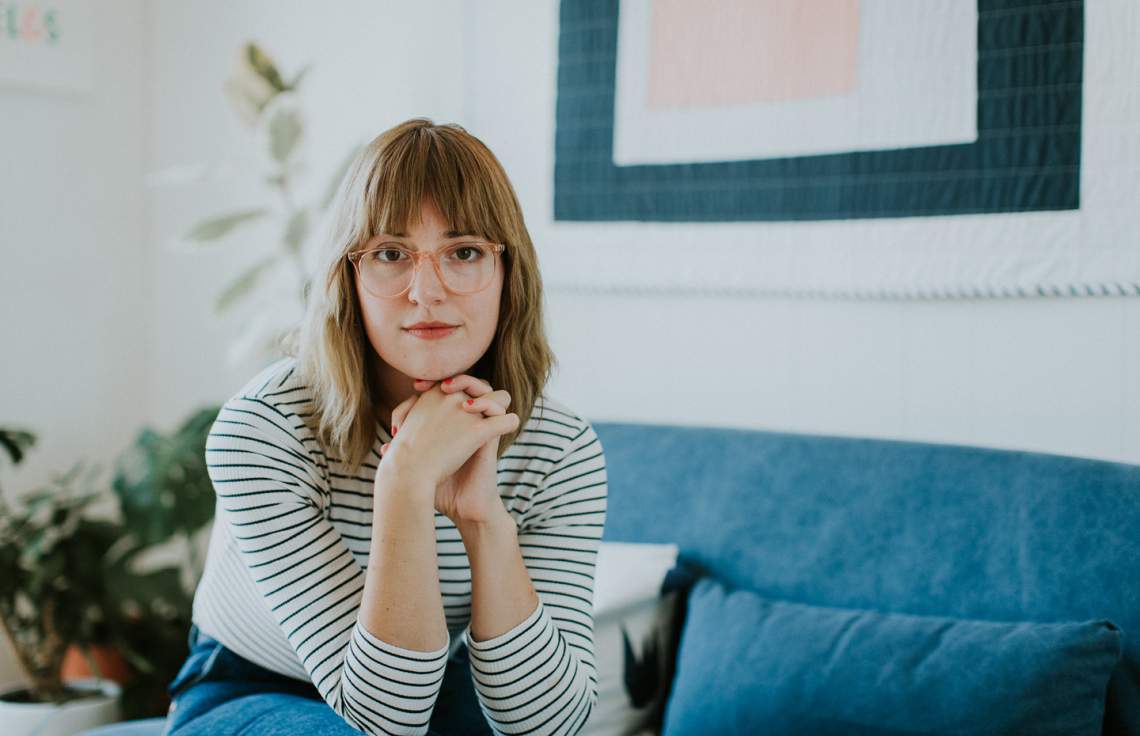
Her Perspective
Where do you look for inspiration? And what do you do to break out of a creative slump?
Definitely my community. I was actually feeling generally uninspired earlier this year, but I came home from a coffee with a friend buzzing with excitement. Jesse (bandmate, husband) said “You need to surround yourself with more people that make you feel like this!” Best advice ever. In college, I was very into Aristotle, so I can’t believe I forgot about his ideas of “excellent friends” (spoiler alert: they make you more excellent). So, I’ve been making a concerted effort to do that this year and it has really helped!
What’s your best advice for a woman who wants to ultimately work for herself?
First, I’ll get the obvious out of the way, which is: make sure your finances are in order, and plan for the worst in that respect. Treat freelancing like a startup and give yourself lots of runway. (I didn’t do that and it was very, very stressful.) Second, make sure working for yourself is for you. Are you a social person? Do you thrive working on a team? Do you have trouble self-motivating? Do you get stuck in your own head (it’s rough in there)?
Let’s talk risks. You have a child now, which completely changes the way you live and work obviously. How do you balance the desire to try new things/take on projects and the need to build a stable life for yourself and your family? Any techniques for hitting that alleged “work-life balance?”
I actually just came to a new realization about this recently. I’ve been noodling on another new business idea (over here), and I’m also just wrapping up my first co-written (basically, ghostwriting with credit) book. I have no time and when I don’t see my son, he gets very fussy (it’s the age) and also I miss him! Plus, I have to pay money for every hour of work I do. There is no other option for things to be more streamlined and more focused. We’ll see—the book is due next week and then Operation Self-Limiting begins. I’m hopeful for more balance and more success for Knit Wit comes out of it.
And finally, what do you wake up looking forward to? What’s next for your career?
Ugh, I’m a mom now so it’s not interesting: It’s all about my son. Career question is more or less answered above, but I’m hoping that more focus will help clarify what my next steps will be outside of Knit Wit. I’ve really enjoyed writing the book and will be working with an agent on that moving forward, but I’m hoping to also bring my editorial and creative direction skills from Knit Wit to some other clients.
You May Also Like
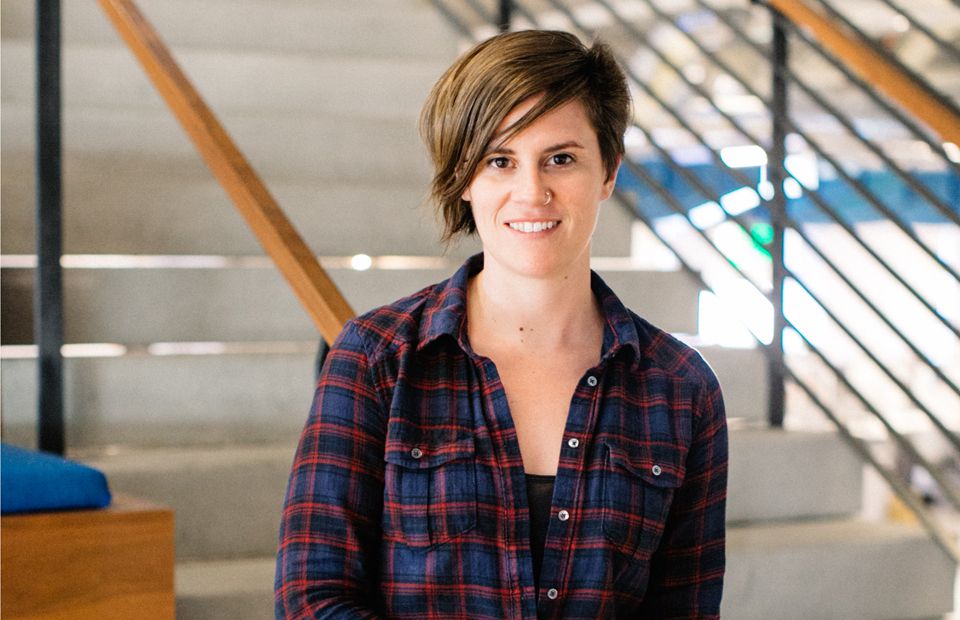
Media
How to Use Positive Reinforcement at Work—and Other Advice from a Pandora PM
"My advice to anyone who wants to get into product management is: check your ego at the door."
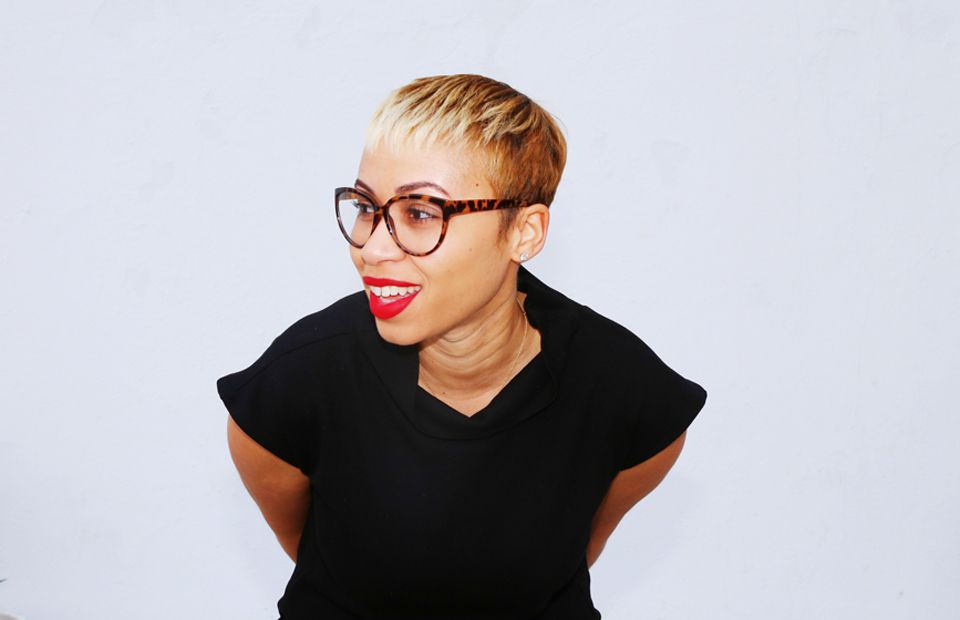
Media, Communications + Public Relations
How to Take Risks, Make a Switch, and Find a Career You Love—From a Woman Who's Done It 4 Times
Making your wildest dreams come true starts with understanding yourself—and Ahyiana Angel can help.
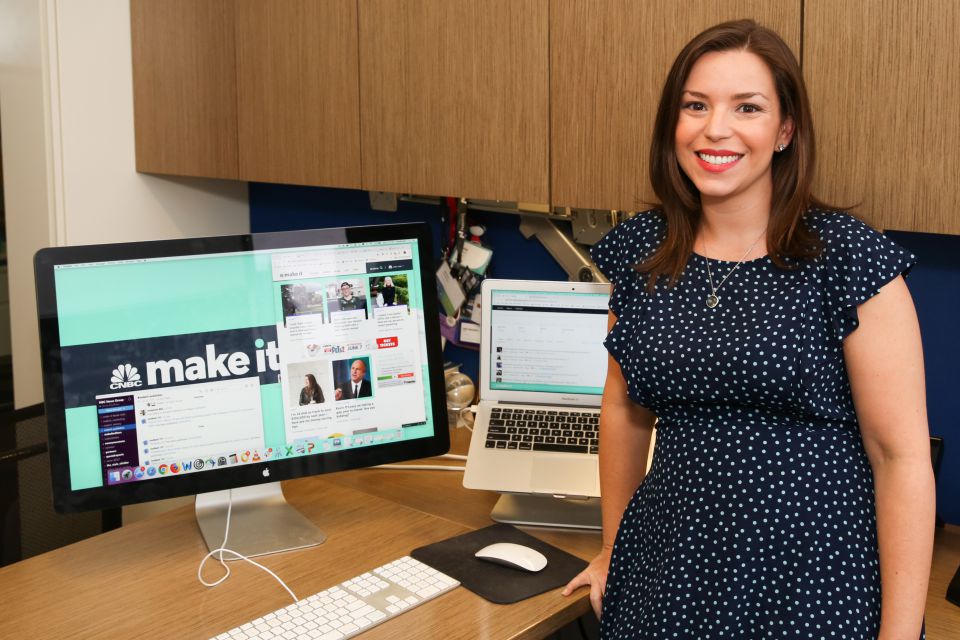
Communications + Public Relations
Creating Content That Empowers Audiences with CNBC's Digital VP and Managing Editor
This week, we interviewed Jenna Goudreau, the VP and managing editor of CNBC Digital. Let's learn how she keeps her powerhouse content creation machine going.
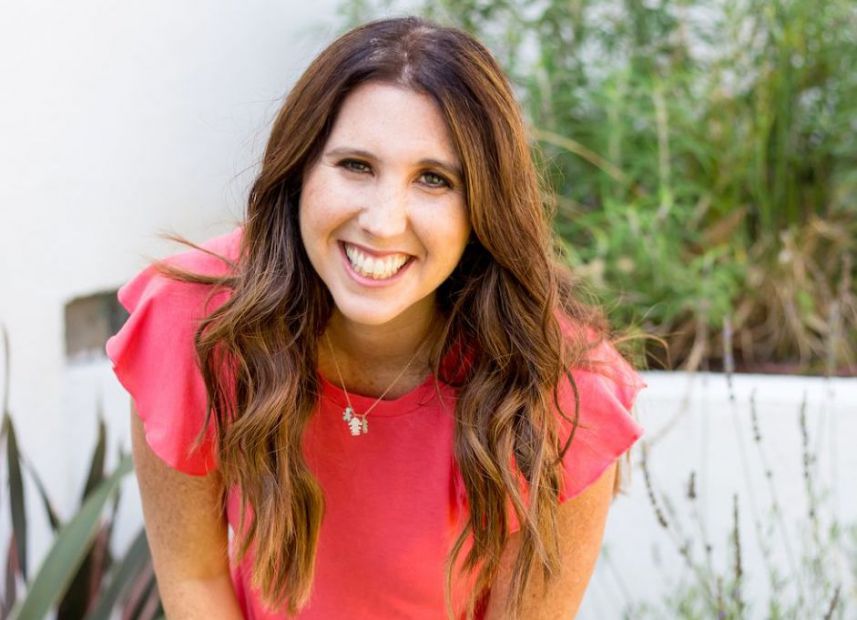
Entertainment
Working Creatively From Home with Cathy Heller
Cathy Heller is a singer, songwriter, entrepreneur, mother—and now, an author. Determined to lift others up to the "happiest versions of themselves," this queen of the hyphenated job title, leads by example. She shared how to build a fulfilling career in a creative field—all while working from home.
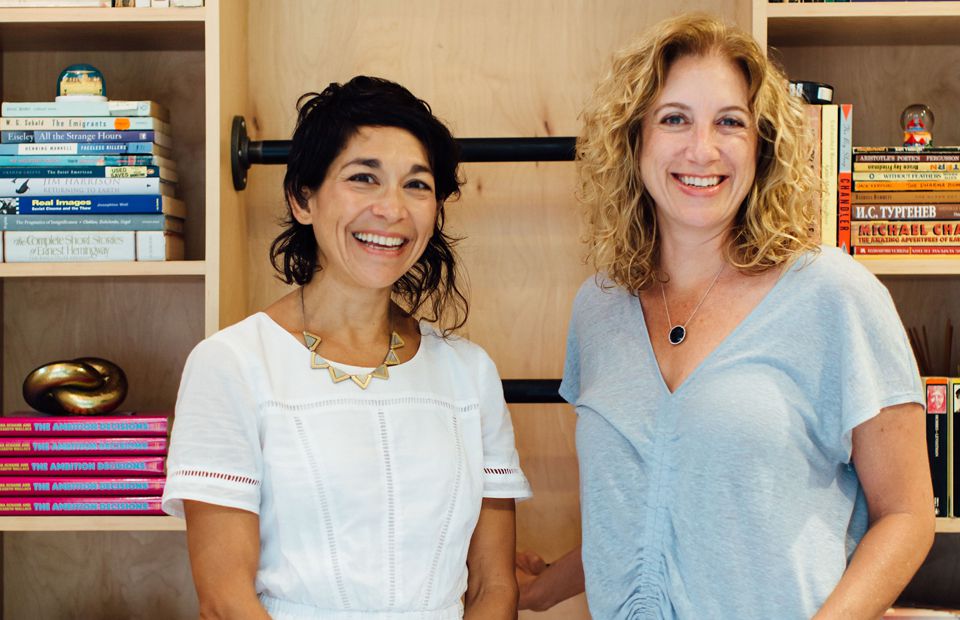
Media
Women, Work, and What It's Like to Write With Your Best Friend—From the Authors of The Ambition Decisions
"We should all give ourselves permission to challenge the things we think can’t be challenged."
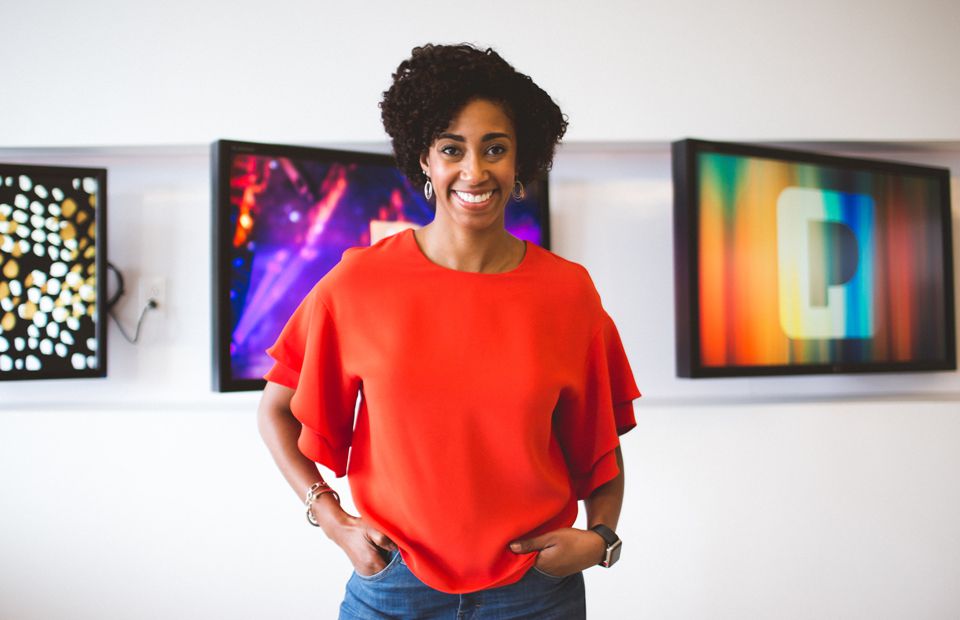
Media
A Director at Pandora on Staying Present, Celebrating Others, and Learning From Failure
"Share your wins, but most importantly, share what your growth areas are, share when you fail, share how you bounced back."
Get the Best Career Advice Delivered To Your Inbox
Join our newsletter to stay in the loop.
